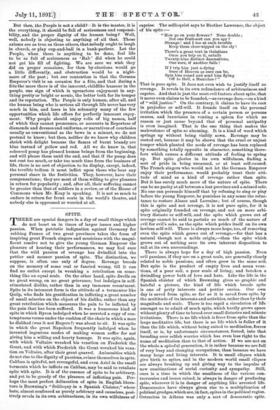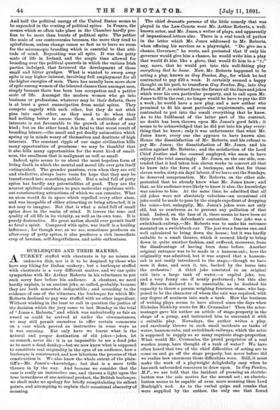SPITE.
THERE are special dangers in a day of small things which do not beset us in times of larger issues and higher passion. When patriotic indignation• against Germany for robbing France of two great provinces takes the form of inspiring great French singers and musicians with the magni- ficent resolve not to give the young German Emperor the pleasure of hearing their performances, we may feel sure that the wild passion of revenge has dwindled into the pettier and meaner passion of spite. The distinction, we suppose, is often one only of degree. Revenge broods on the memory of some real or fancied wrong, till it can find no outlet except in wreaking a retribution on some- thing like an equal scale. On the other hand, spite dwells on no great wrong, on no great grievance, but indulges in self- stimulated dislike, rather than in any immense resentment. Spite in its intensest form is the attitude of a tormentor like Quilp, who finds his gratification in inflicting a great number of small miseries on the object of his dislike, rather than any great retribution which measures the pain to be inflicted by the pain that has been suffered. It was a humorous kind of spite in which Byron indulged when he secreted a copy of con- temptuous verses under the cushion of the chair in which a man he disliked (was it not Rogers ?) was about to sit. It was spite in which the great Napoleon frequently indulged when he invented ingenious modes of making women suffer for not giving him a willing and hearty homage. It was spite, again, with which Voltaire wreaked his vexation on Frederick the Great, and with which Frederick the Great wreaked his vexa- tion on Voltaire, after their great quarrel. Animosities which do not rise to the dignity of passions, evince themselves in spite. Caliban is spiteful, not revengeful, and even Ariel in the small torments which he inflicts on Caliban, may be said to retaliate spite with spite. It is of the essence of spite to be arbitrary, and yet to be greedy of the pleasure of inflicting pain. Per- haps the most perfect delineation of spite in English litera- ture is Brovrning's "Soliloquy in a Spanish Cloister," where hate, almost confessed as purely arbitrary and causeless, posi- tively revels in its own arbitrariness, in its own wilfulness of
caprice. The soliloquist says to Brother Lawrence, the object of his spite :— " How go on your flowers ? None double ; Not one fruit-sort can you spy P Strange! and I too at such trouble Keep them close-nipped on the sly !
There's a great text in Galatians Once you trip on it, entails Twenty-nine distinct damnations, One sure, if another fails !
If I trip him just a-dying
Sure of Heaven as sure can be, Spin him round and send him flying Off to Hell, a Manichee P "
That is pure spite. It does not even wish to justify itself as revenge. It revels in its own redundanee of arbitrariness and caprice. And that is just the most evil feature about spite, that it never even claims to be founded,—as revenge does,—on a kind of "wild justice." On the contrary, it claims to have its root in prejudice or self-will. It founds itself on the personal irritation which the presence of a certain person or persons causes, and luxuriates in venting a spleen for which no reason or just cause beyond that of personal antipathy is even imagined. That is the one thing that makes the malevolence of spite so alarming. It is a kind of weed which
springs up without being visibly sown. Revenge may be rooted out, because it may be shown that the cruel or unjust temper which planted the seeds of revenge has been replaced by something totally opposite in character, something there-
fore which causes a different attitude of feeling to spring up. But spite glories in its own wilfulness, finding a sort of pride in being uncaused, or at least self-caused. The French singers who would not let the German Emperor enjoy their performance, would probably treat their atti- tude of mind as a kind of revenge rather than spite. But it has surely much more of the nature of spite. There
can be no parity at all between a lost province and a missed solo.
No one can persnade himself that by refusing to sing or play before the young Emperor, he punishes in any sense the reluc- tance to restore Alsace and Lorraine; but of course, though this is spite and not revenge, it is not pure spite, for it is spite originally founded on revenge, and not on mere arbi- trary distaste or self-will, and the spite which grows out of revenge cannot be said to partake as much of the nature of evil for evil's sake, as the spite which prides itself on its own lawless self-will. There is always more hope, too, of removing even the spite which grows out of revenge,—for that has a natural though not a noble origin,—than the spite which grows out of nothing save its own inherent disposition to rail at its own surroundings.
There is always hope for a day of high passion. Even
evil passiens, if they are on a great scale, are generally closely related to noble passions, and often grow in the same soil. But spite is the product of empty lives and mean vexa- tions, of a poor soil, a poor scale of living; and betoken a dwindling power both of love and hate. Like the life in the Spanish cloister of which Browning gives so graphic and
hateful a picture, the kind of life which breeds spite is one of petty interests and pettier envies. Our own day is saved from spite, so far as it is saved from spite, by the multitude of its interests and activities, rather than by their magnitude and scale. There is too rapid a circulation of life
amongst us to admit of much spite, which hardly grows apace without plenty of time to brood over small distastes and minute
irritations. There is no life which is freer from spite than the large meditative life, but there is no life which is fuller of it than the life which, without being suited to meditation, forces itself, or is, by unfortunate circumstances, forced, into that brooding over selfish worries which has even less right to the
name of meditation than to that of action. If we are not on the whole a spiteful generation, it is rather because we are full of very busy and changing occupations, than because we have many large and living interests. It is small cliques which
give birth to spites, and in the modern world small cliques are always breaking up and giving way to the impulse of new combinations of social curiosity and sympathy. Still, ours is a time in which the smallness of the various con-
troversies and issues raised, is always in danger of producing spite, wherever it is in danger of anything like arrested life. Democracies have always given rise to a multiplication of political grudges, which are, in fact, spites in the political region.
Ostracism in Athens was only a sort -of democratic spite. And half the political energy of the United States seems to be expended in the venting of political spites. In France, the scenes which so often take place in the Chamber hardly pro- fess to be more than bursts of political spite. The pettier the Beale of our controversies becomes, the more they tend to spitefulness, unless change comes so fast as to leave no room for the microscopic brooding which is essential to that atti- tnde of mind. Boycotting was all spite. It was the petty scale of life in Ireland, and the ample time allowed for brooding over the political quarrels in which the various Irish parties indulged, that favoured the development of those small and bitter grudges. What is wanted to sweep away spite is any higher interest, involving full employment for all the higher energies of men. There has usually been more show of spite among women of the leisured classes than amongst men, simply because there has been less occupation and a pettier scale of life. Amongst the modern women who go into business or professions, whatever may be their defects, there is at least a great emancipation from social spites. They compete eagerly with each other, but they do not stick pins into each other, as they used to do when they had nothing better to amuse them. A multitude of small interests is not favourable to the growth of ardour of any kind; but on the other hand, it is fatal to that worst result of brooding leisure,—the small and yet deadly animosities which spring up in minds weary of themselves and destitute of high interests. The constant ripple of our eager civilisation kills many opportunities of greatness : we may be thankful that it also kills many opportunities for the worst kind of small- ness, the smallness that is malignant as well as small.
Indeed, spite seems to us about the most hopeless form of living death in which the mental and moral life ever gets itself extinguished. The grander passions, even when they are evil and vindictive, always leave room for hope that they may be transformed into something nobler. But a mind full of petty spites has hardly any potentialities of good. They are the nearest spiritual analogues to pure molecular repulsions with- out counteracting attractions, of which we can conceive. What an atom would do in space which repelled every other atom, and was incapable of either attracting or being attracted, it is not easy to imagine. But that is what a mind full of small spites does in the realm of mind. It lowers the tone and quality of all life in its vicinity, as well as its own tone. It is purely destructive. No great nation should ever permit itself so fatal a spirit. Compared with spite, war itself is a healing influence ; for though war, as we see, sometimes produces an after-crop of petty spites, it also produces a rich immediate crop of heroism, self-forgetfulness, and noble enthusiasm.



































 Previous page
Previous page